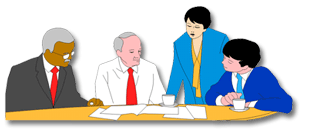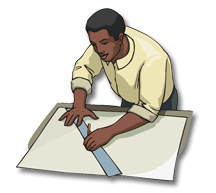| |
4.1 UNDERSTAND THE INTERVIEW PROCESS |
| |
|
| |
What to Know |
| |
|
| |
The purpose of all interviews is to find the best person for the job. However, interviews can be conducted in different ways. Interviewing is a two-way process. |
| |
|
| |
The Interview |
| |
- An individual interview is like an in-depth conversation. The interviewer may be the person who will be your supervisor. Hiring decisions are often made based on this type of interview. Count on discussing your skills, experience, training and how they all relate to the duties and opportunities of the job. There will usually be time for you to ask questions. You must sell your:
- skills;
- enthusiasm;
- interest; and
- understanding of the job.
|
| |
 |
- A panel interview is frequently used by government agencies and companies filling a professional or managerial position. Usually three or more people sit on the board, and all candidates are asked the same questions. A selection board interview usually involves more structured questions than an individual interview, and generally does not include a discussion of salary and benefits.The process can be stressful because you have to answer questions from several people. Be sure to make eye contact with everyone on the panel. When answering a question, it is especially important to make eye contact with the person who asked the question.
|
|
| |
- The phone interview is another strategy that some employers use. In this situation, the hiring manager or selection committee interviews job applicants over the telephone as a screening technique. Phone interviews are used to make a first round of cuts to the applicant pool. If the employers are interested in candidates they will then schedule face-to-face interviews. Remember, as soon as you pick up the telephone you are making an impression. Be sure to review the telephone tips in section 2.
|
| |
- Stress interviews are another format that some employers, frequently law enforcement organizations, use to evaluate candidates. The interviewers’ job is to intimidate you. They want to find out how you handle stress. The rationale behind the tactic is that if you’re unable or unwilling to handle conditions of imposed stress, it’s unlikely you’ll have the ability to maintain your composure under conditions of real stress. In response to this tactic, it’s important that you don’t react defensively, but instead remain calm and respond appropriately.
|
| |
- The observational interview format may be used by an employer. In this format, the candidate is asked to demonstrate his/her abilities with some of the skills required for the position. This may include giving a demonstration of public speaking ability, answering telephone calls, or operating a piece of equipment while the interviewer observes your performance.
|

|
|